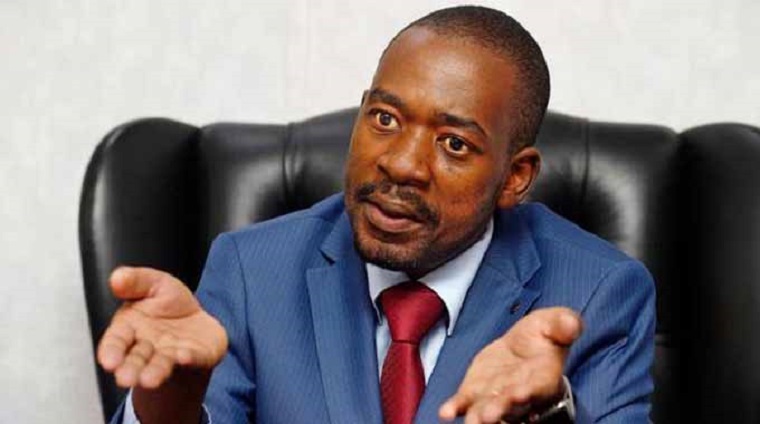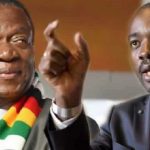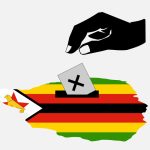 Citizens Coalition for Change leader Nelson Chamisa has been adamant that he is winning the elections this Wednesday.
Citizens Coalition for Change leader Nelson Chamisa has been adamant that he is winning the elections this Wednesday.
“We can’t lose, we will not accept fake things. Victory is ours. We will win this election. Anything that is announced outside our victory is a lie, it’s fiction,” he was quoted as saying recently.
But whispers from way back in February said that Chamisa had thrown away the elections in a deal that he struck with President Emmerson Mnangagwa. His only problem was Job Sikhala.
The whispers said that Chamisa was afraid that if Sikhala, who has been on remand in prison since June last year, was released before the elections he could scuttle the deal.
Although Chamisa says no one holds any portfolio in the CCC apart from himself and his two spokespeople Fadzayi Mahere and Ostallos Siziva, Sikhala was the vice-chairman of the MDC Alliance before the Supreme Court ruling that nullified Chamisa’s leadership of that party. Chamisa subsequently formed the CCC but said none of his lieutenants held the posts that they had held in the MDC Alliance. CCC has not held any congress and according to Chamisa himself, it has not yet been formally launched.
Whispers say although Chamisa’s top lieutenants were Welshman Ncube, Tendai Biti, Lynette Karenyi and Thabitha Khumalo, Chamisa was afraid of Sikhala who had been Khumalo’s deputy because Sikhala had the capacity to mobilise people and was very popular because of his confrontational approach that he could rival Chamisa. Sikhala was so popular with the people that could easily lead a popular revolt against ZANU-PF or even against Chamisa.
Welshman Ncube did not have any organisational capacity. He was not popular with the people, either. Biti was not popular with the people but was the darling of the West and could easily mobilise funds to revive the country’s economy if he got the chance to lead.
The whispers said that Chamisa had struck the deal with Mnangagwa and his Zimbabwe African National Union-Patriotic Front to throw away the elections but he insisted that they had to rein in Sikhala.
While the allegations are difficult to prove, they were given some traction by Temba Mliswa when he said that the blunders that Chamisa made in the selection and nomination of party candidates for the pending elections made one believe that Chamisa had been bought by ZANU-PF.
“When people allege that Chamisa may have been paid by ZANU-PF these are the kind of things that make one start to have an inkling of belief in that. How do you make such a monumental blunder from such a simple exercise? How is it justified now they still have double candidates?” Mliswa tweeted.
Chamisa’s low profile and haphazard campaign this year seems to give credence that he threw away the elections but he has such massive support that he has to put on the show.
What remains to be seen is how he will react if he loses by a small margin.
Chamisa’s low profile campaign and the massive rallies that ZANU-PF has held, have given the ruling party room to rig the elections and get away with it and if Chamisa was indeed bought, he will continue with the charade of protesting his loss.
The Insider is not surprised if Chamisa threw away the elections because both Chamisa and Sikhala have been accused of working for ZANU-PF way back from 2003.
The allegations were made by Trudy Stevenson, a member of the Movement for Democratic Change, who later became Zimbabwe’s ambassador to Senegal. She also named Learnmore Jongwe and Tafadzwa Musekiwa.
Besides, Chamisa seems to have enjoyed a cosy relationship with Mnangagwa even before he became President.
(263 VIEWS)


Pingback: Chamisa calls for release of Job Sikhala but told if you can’t free one Cde how can you free Zimbabwe | The Insider
Pingback: Chamisa told be our political leader Zimbabwe has enough prophets | The Insider
Pingback: Is there a conspiracy to keep Job Sikhala in prison? | The Insider
Pingback: I was born to build not to destroy or fight, Chamisa says | The Insider
Pingback: Is it mere coincidence that Sikhala is released soon after Chamisa quits CCC? | The Insider
Pingback: Who gave ZANU-PF two-thirds majority- Chamisa or Tshabangu? | The Insider